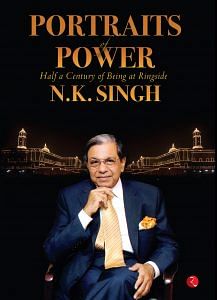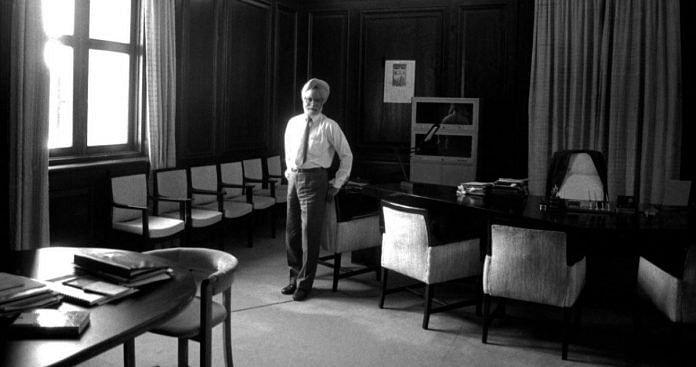The Annual Meeting of the IMF and the World Bank in Bangkok between 15 and 17 October (1991) provided an important opportunity to the finance minister to articulate India’s new development strategy. Speaking at the meeting, Dr Singh said,
Our immediate priority was to restore confidence in our economy and maintain our unblemished record of not defaulting in our international payments. I am proud to say [that] we have been able to do so. The new government has moved to restore macroeconomic stability through fiscal restraint [and] monetary discipline and restructure our economic management.
His address at the Annual Meeting facilitated a greater understanding of our new initiatives among a wider audience and beyond the negotiation dynamics with multilateral institutions.
There were some comic instances, too. In one of the briefing meetings being held by Dr Singh in his room with other members of the delegation, there was a knock on the door and Rahul Khullar, at that time his private secretary, was asked to check who it was. To everyone’s amazement, it was the Hinduja brothers, Srichand and Gopichand. They were keen to see the finance minister but were content with handing over a letter to him with the caption, ‘For your eyes only’. Rahul brought this letter in and placed it next to Dr Singh’s table. Curiosity ran high among all members of the delegation. Dr Singh, restless as he was, decided to open the letter and read it since it seemed to be a breathtaking piece of intelligence/information. Unfortunately, the contents of the letter were somewhat of an anti-climax, because it was largely reciting what Dr Singh was likely to hear from the then World Bank Group president, Louis Preston, in their bilateral meeting the next day. There was nothing much of the James Bond intrigue or suspense to deserve the caption ‘For your eyes only’.
In all fairness, the Hindujas had only acted in good faith to forewarn about what was expected the following day. The Hindujas, while never being shy in promoting their business interests, have sought to be helpful to the country in times of need like the first oil crisis, the BoP difficulties in 1991 and in arranging helpful appointments with foreign institutions and dignitaries.
Also read: In images — Manmohan Singh, India’s PM who held office twice without contesting an election
There was another anecdote from the dinner that Dr Singh wanted to host for the senior management of the Bank and the Fund in the famous Chinese restaurant of the Mandarin Oriental Hotel in Thailand. Our ambassador, Vinay Verma, decided that even in a Chinese restaurant, some Indian food must be served; as a result, in addition to Chinese food, all kinds of Indian items came in quick succession. This was somewhat of a bizarre experience for the guests, not to speak of the host himself. The dinner was soon coming to an end, but not before the finance minister could get an explanation as to why and how this was so. It was our first experience of eating highly spicy Indian cuisine in a well- established Chinese restaurant in Bangkok.
On a parallel track, during the negotiations with the World Bank and the IMF, we also initiated intensive dialogues with the ADB. This was both to broaden our source of borrowing and enhance the quantum of fast-disbursing loans. We concluded a hydrocarbon- sector programme loan with the ADB on 17 December, whose basic condition was the reform of that sector. In pursuance of this agreement, we received the first tranche of the loan in February 1992. This was a modest amount of $125 million.
During these negotiations, I remember that the Minister of Petroleum and Natural Gas, B. Shankaranand, was reluctant to accept any suggestion to dilute the shares in the petroleum companies. I persuaded Dr Singh to accompany me to see Shankaranand. Shankaranand looked intently at me and said that I should not forget that public sector undertakings in the oil sector were the temples of modern India built by Jawaharlal Nehru and it would be impertinent and audacious to suggest that these temples would now be desecrated. Dr Singh looked perplexed. He left the meeting without a definite conclusion. Later, we did persuade the ADB to drop this conditionality from their programme. We agreed that the issue of diluting government equity in the hydrocarbon sector would be addressed in a broader context.
Also read: If GST is not simplified, it’s very purpose is defeated: Finance commission chief NK Singh
A couple of weeks before the presentation of the Budget of 1992, I returned from Washington after successfully negotiating some structural benchmarks and quarterly performance criteria with the World Bank. I came to office feeling elated about my success in securing the agreement. However, I was suddenly called by the finance minister, who told me in anguish that he may have to resign since some of the commitments that had been made in Washington by me, which were to figure in his forthcoming Budget speech on 29 February 1992, had been leaked. He came to learn of these leakages from some intelligence sources as well as senior journalists ringing him up to inform him of their impending publication in The Indian Express. If this was true, he had little option but to resign.
I went to my room perplexed, but was audacious enough to ring up the World Bank Director in charge of India, Heinz Vergin, at 4 a.m., Washington time. I told him my predicament and wanted to know where the documents that had been signed were lying and whether there was any possibility of their leakage. He assured me multiple times that they were safe in the vaults of the World Bank and that there was no possibility of any leakage whatsoever.
Emboldened, I went back to inform Dr Singh, who, while remaining sceptical, sincerely hoped that what I was telling him would be the course of events. In hindsight, both Vergin and I were right—the documents were safe and the news items published were at sharp variance with the negotiation dynamics. Everything was alright, but these were tense times.
Broadly speaking, the borrowing programme entailed a quarterly performance criterion, namely the policy changes to be fulfilled or implemented by the borrower to enable the next tranche of the loan to be utilized. A system of cross-conditionalities was followed, which was an agreement with both the Bank and the Fund. The quarterly performance criteria laid down the borrowing requirements of the Union government along with the monetary objectives consistent with the programme. The Fund programme concentrated on the macro issues, while the Bank programme related to structural benchmarks in key sectors of the economy, including industrial policy, trade liberalisation, domestic pricing policies, public enterprise reform, financial sector reform, tax reform and expenditure control and, on the legislative side, amendments to the MRTP Act, 1969; Foreign Exchange Regulation Act (FERA), 1973; and the Sick Industrial Companies (Special Provisions) Act 1985, to mention a few.
These programmes, which have been outlined in the annexure pertaining to this chapter at the end of the book, suggest prescriptions into domestic policy changes that had often been pejoratively described as the Fund/Bank-dictated policy.
 This excerpt from Portraits of Power: Half A Century Of Being At Ringside by N.K. Singh has been published with permission from Rupa Publications.
This excerpt from Portraits of Power: Half A Century Of Being At Ringside by N.K. Singh has been published with permission from Rupa Publications.



